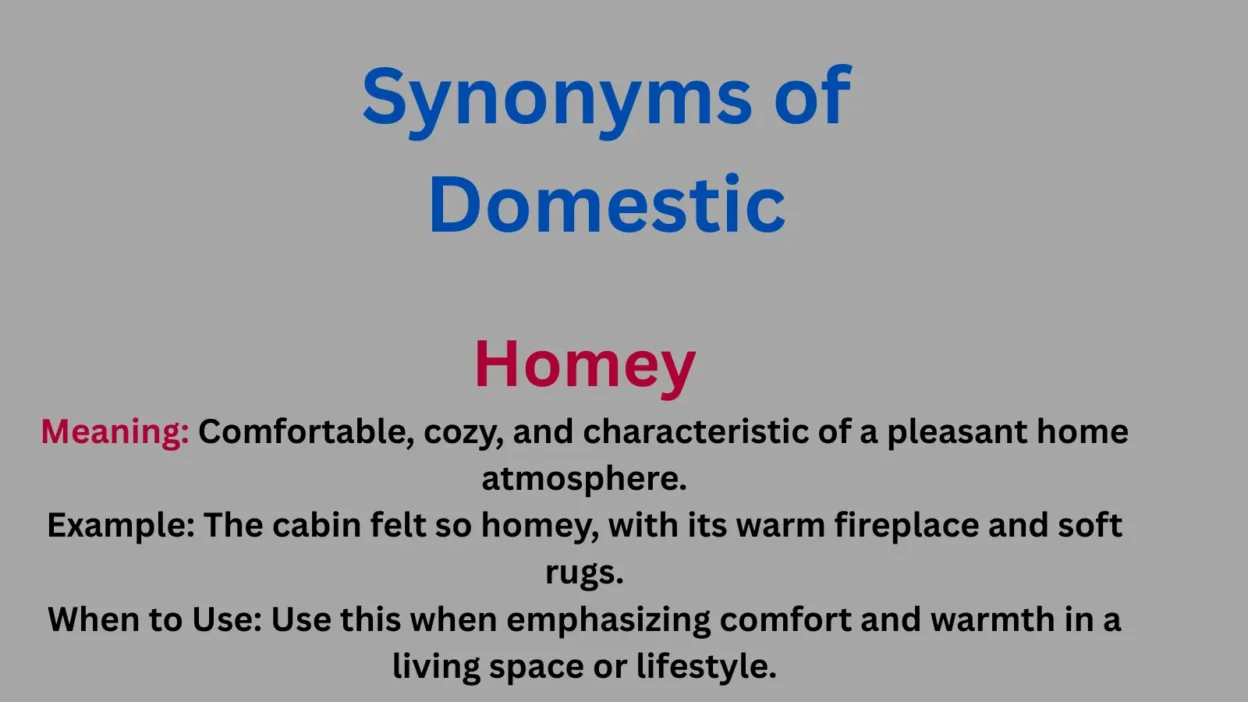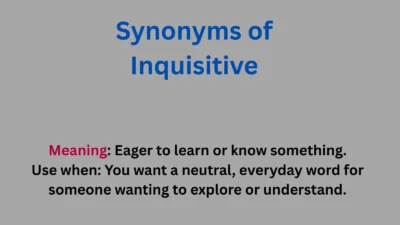Synonyms of Domestic include words like household, home, internal, and local, each reflecting a different aspect of the word depending on context. If you’re talking about domestic life, domestic animals, or domestic affairs within a country, the right synonym of domestic can help you convey your meaning more accurately.
For example, household fits well when referring to family or home settings, while internal is better suited for national or political contexts. In this guide, we’ll explore the most appropriate alternatives to “domestic” and show you how to use them effectively across various subjects.
Expanding your understanding of synonyms of domestic will sharpen your language and help you communicate with greater clarity and precision.
What Does Domestic Mean?
At its core, domestic relates to anything associated with the home or family life. It can mean:
- Related to the household: chores, animals, or routines inside the home.
- Native or internal: like a domestic issue within a country.
- Modest, reserved, or shy: describes a person who prefers home comforts or a quiet life.
In this article, we’ll focus mainly on the modest, reserved, or home-related nuances of domestic and explore synonyms that carry similar meanings or tones.
30 Synonyms of Domestic: Meanings, Examples, and When to Use Them
1. Homey
Meaning: Comfortable, cozy, and characteristic of a pleasant home atmosphere.
Example: The cabin felt so homey, with its warm fireplace and soft rugs.
When to Use: Use this when emphasizing comfort and warmth in a living space or lifestyle.
2. Homely
Meaning: Plain or simple, often describing a modest or unpretentious appearance or environment.
Example: She had a homely charm that made everyone feel at ease.
When to Use: Good for describing people or places that are not flashy but warm and welcoming.
3. Household
Meaning: Related to the daily activities or members of a family living together.
Example: Household chores include cooking, cleaning, and laundry.
When to Use: Use this to describe practical aspects of home life or family units.
4. Residential
Meaning: Connected to living spaces or areas where people reside.
Example: They moved to a quiet residential neighborhood.
When to Use: When describing locations or zones meant for living rather than commercial or industrial use.
5. Native
Meaning: Originating from a particular place or environment.
Example: The native plants of this region are drought-resistant.
When to Use: When talking about origin or natural belonging rather than home life.
6. Local
Meaning: Belonging to or relating to a particular area or community.
Example: I prefer to buy local produce to support nearby farmers.
When to Use: When stressing geographical closeness or community ties.
7. Internal
Meaning: Existing or occurring inside something, such as a country or organization.
Example: The company faced some internal conflicts last year.
When to Use: For issues or things within a system, not necessarily related to the home.
8. Private
Meaning: Personal or belonging to an individual rather than the public.
Example: They enjoyed a quiet, private dinner at home.
When to Use: To describe something reserved or shielded from public view.
9. Intimate
Meaning: Closely personal or familiar; private.
Example: They shared an intimate family gathering.
When to Use: Use this when highlighting close relationships or a cozy atmosphere.
10. Modest
Meaning: Not showy or boastful; humble.
Example: She lived a modest life in a small town.
When to Use: When describing simplicity or humility.
11. Subdued
Meaning: Quiet, controlled, or restrained in mood or style.
Example: The room was decorated in subdued colors, creating a calm ambiance.
When to Use: To describe something restrained or low-key.
12. Quiet
Meaning: Free from noise or disturbance; calm.
Example: They enjoyed a quiet evening at home.
When to Use: To highlight peaceful or calm environments.
13. Tranquil
Meaning: Peaceful and calm, often describing environments.
Example: The countryside provided a tranquil retreat.
When to Use: When emphasizing serenity and peace.
14. Domesticated
Meaning: Tamed or adapted to living with humans (usually animals).
Example: The cat was fully domesticated and loved living indoors.
When to Use: To describe animals or plants adapted to home life.
15. Simple
Meaning: Plain, not complicated or elaborate.
Example: They preferred a simple lifestyle without extravagance.
When to Use: When emphasizing minimalism or straightforwardness.
16. Unpretentious
Meaning: Not attempting to impress others with an appearance of greater importance.
Example: His unpretentious home welcomed all guests warmly.
When to Use: To describe humble, sincere environments or people.
17. Cozy
Meaning: Giving a feeling of comfort, warmth, and relaxation.
Example: The cabin was small but cozy.
When to Use: To describe inviting, warm environments or moods.
18. Protected
Meaning: Kept safe from harm or danger.
Example: The children felt protected in their family home.
When to Use: When emphasizing safety or security.
19. Retiring
Meaning: Shy or reserved in nature.
Example: She had a retiring personality and preferred solitude.
When to Use: To describe modest, shy people.
20. Shy
Meaning: Nervous or reserved in social situations.
Example: The shy boy rarely spoke up in class.
When to Use: When focusing on a person’s reserved social behavior.
21. Meek
Meaning: Quiet, gentle, and easily imposed on; submissive.
Example: Despite his meek demeanor, he was very determined.
When to Use: To describe gentle or submissive personalities.
22. Timid
Meaning: Showing a lack of courage or confidence; easily frightened.
Example: The timid kitten hid under the sofa.
When to Use: When describing nervous or cautious behavior.
23. Docile
Meaning: Ready to accept control or instruction; submissive.
Example: The dog was docile and well-trained.
When to Use: For compliant or obedient behavior.
24. Mild
Meaning: Gentle or moderate in behavior or effect.
Example: He has a mild temperament, rarely getting angry.
When to Use: When describing gentle, calm personalities or conditions.
25. Reserved
Meaning: Slow to reveal emotions or opinions; quiet.
Example: She was reserved but kind once you got to know her.
When to Use: For people who keep to themselves emotionally.
26. Gentle
Meaning: Kind, soft, or mild in behavior or action.
Example: His gentle touch reassured the frightened child.
When to Use: To highlight kindness and softness.
27. Sociable
Meaning: Willing to talk and engage with others.
Example: Unlike her shy sister, she was quite sociable.
When to Use: To contrast with shy or reserved behavior.
28. Tame
Meaning: Not wild; domesticated or docile.
Example: The tame rabbit hopped around the garden freely.
When to Use: For animals or sometimes people who are calm and manageable.
29. Close-knit
Meaning: United by strong relationships, often referring to families or communities.
Example: They come from a close-knit family that supports each other.
When to Use: To describe strong bonds and intimacy in groups.
30. Introspective
Meaning: Thoughtful and reflective, often inward-looking.
Example: Her introspective nature made her a deep thinker.
When to Use: When focusing on thoughtful, inward qualities.
How to Choose the Right Synonym
- Consider the emotional tone: Are you describing a warm, cozy home (try cozy or homey), or a shy, reserved person (try timid or reserved)?
- Think about the context: For places, words like residential or local work well; for personality traits, consider meek or gentle.
- Cultural sensitivity: Some words like homely can mean “plain” in English but “beautiful” in other cultures (e.g., British English vs. American English), so be mindful of your audience.
- Formality level: Words like modest and subdued fit formal writing; cozy and homey are more casual and conversational.
Conclusion
The word domestic can take on many meanings depending on the context, ranging from home life to national affairs. By using synonyms like household, home, internal, or local, you can tailor your language to better reflect your intended message.
Each alternative offers a slightly different nuance, helping you communicate more clearly whether you’re writing about family dynamics, politics, or everyday routines.
Expanding your vocabulary with these synonyms allows for more precise and effective expression across a variety of topics.




